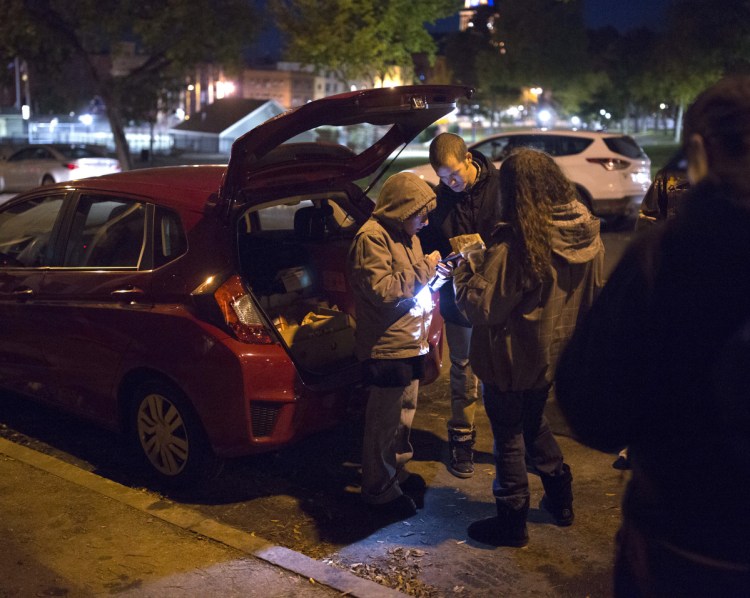A mobile needle exchange program says it will halt the distribution of sterile needles in Lewiston after the Lewiston Police Department told the program’s founder to stop or risk being charged with a misdemeanor.
Even so, Jesse Harvey says the visits will continue and he will keep handing out free naloxone – an opioid overdose antidote – and other items meant to help combat the state’s opioid crisis.
The program, which Harvey calls the Church of Safe Injection, has hosted mobile needle exchange sites in Lewiston every few weeks on Spruce Street across from Kennedy Park, operating out of the back of a Honda hatchback. The next visit is scheduled for 8:30 p.m. Wednesday and will run for about 90 minutes, Harvey said.
The program, which started in late summer, has hosted events in Lewiston, Biddeford, Caribou and Bangor, and operates in a legal gray area, public health experts say. Maine law prohibits people from distributing sterile hypodermic needles, but Maine health agency rules support “secondary exchange” programs that allow people to take more needles than they will personally use and distribute them to others who may need them. Harvey is designated as a “secondary exchange” recipient for needle exchange programs in Portland and Bangor.
Although he calls the program a church and has described syringes and naloxone as its “body and blood,” Harvey does not consider himself to be a religious leader. He said he hopes to attain nonprofit status with the IRS. The program began with less than $1,000 in funding and received supplies worth another $1,000 from a donor Harvey has declined to identify.
Needle exchange programs are effective at preventing diseases caused by sharing used needles, such as AIDS and hepatitis C, according to annual reports by the Maine Department of Health and Human Services. Maine’s needle exchange programs operate at fixed locations in Portland, Bangor, Ellsworth, Machias and Augusta. More than 5,200 Mainers used the exchanges between November 2016 and October 2017, according to the annual report.
Harvey contends the mobile sites are needed in major population centers in Maine that do not have fixed needle exchange locations – such as Lewiston and York County – which was part of the inspiration for starting his program. Lewiston’s needle exchange program closed in 2017.

Jesse Harvey holds naloxone, the heroin overdose antidote, which he gives out to people who may need it. Harvey says he will continue giving out naloxone.
Harvey said Lewiston police told him that they see the distribution of the needles as a violation of state law, and would cite him for a misdemeanor if his group hands them out. Harvey said he will comply with the law, but still will have the Wednesday event, handing out naloxone and other items such as condoms, alcohol wipes and food.
Harvey said he does not fault Lewiston police, but blames the system that criminalizes life-saving activities.
“I respect what the law enforcement officers are doing, and I am not for a minute suggesting the Lewiston Police Department are the villains here. What we need to happen is a complete decriminalization of hypodermic syringes,” Harvey said.
A Lewiston police spokesman did not respond to a request for comment Monday about the mobile needle exchange program. Harvey said if the program hosts events in other cities or towns, he and volunteers will distribute hypodermic needles unless local police tell them not to.
Maine continues to be in the throes of the opioid crisis, with 418 drug overdose deaths in 2017 and 180 deaths through the first half of 2018, according to state statistics.
Harvey said the Church of Safe Injection has helped prevent disease and likely saved lives, with more than 70 people using the program since it started hosting a few events in late summer.
Meanwhile, Harvey said the mobile program should be a temporary solution to opening more fixed needle exchange programs in Maine, and he plans to form a partnership to submit applications with the state to open new needle exchange programs in Lewiston and Biddeford. Brick-and-mortar needle exchange programs must be licensed by the Maine Center for Disease Control and Prevention.
Harvey said he may wait until Governor-elect Janet Mills takes office in January before submitting an application. Mills emphasized an aggressive approach to the opioid crisis during the gubernatorial campaign, including expanding treatment.
Scott Ogden, a Mills spokesman, said the issue will be on Mills’ plate once she assumes office.
“The governor-elect recognizes the value and effectiveness of harm-reduction programs, like needle exchanges, in preventing the spread of contagious diseases and saving lives, and she will carefully evaluate the need for any additional needle exchange sites,” Ogden said in a statement.
Joe Lawlor can be contacted at 791-6376 or at:
jlawlor@pressherald.com
Twitter: joelawlorph
Send questions/comments to the editors.



